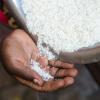
Options Magazine, Winter 2022: A study on the sustainability of rice production pinpoints methods to improve rice management and thereby food security in Senegal.
Like most African countries, Senegal is dependent on rice as a staple food for its population. However, the West African nation annually imports more than 70% of its rice to meet demand.
In recent years, the government has tried to increase self-sufficiency, but both supply and yields remain low. This is largely due to irrigation infrastructure challenges, low access to effective fertilizers, and effects from climate change.
In a study published in the Journal of Environmental Management, Neus Escobar and her coauthors applied life cycle assessment and life cycle costing to assess the sustainability of rice production in Ross Bethio, Saint Louis, Senegal, based on field data collected during the dry seasons of 2016 and 2017.
Their results suggest that improving fertilization and mechanization practices can help Senegal, and possibly all of West Africa, increase sustainable food production. Specifically, the study shows that well-designed fertilizer application doses and timing can increase yields while decreasing environmental impacts relative to conventional and more intensive practices.
“Improving rice management is key to achieving food security in West Africa and contributing to long-term sustainability of farming systems,” explains Escobar, a researcher in the Integrated Biosphere Futures Research Group of the IIASA Biodiversity and Natural Resources Program. “Our findings provide guidance to smallholder farmers in Senegal to optimize crop management practices under conditions of limited access to water, machinery, and modern fertilizers, in order to increase rice yields and farm income while reducing environmental impacts.”
by Jeremy Summers
Publication
Escobar Lanzuela, N. , Bautista, I., Peña, N., Fenollosa, M.L., Osca, J.M., & Sanjuán, N. (2022). Life Cycle Thinking for the environmental and financial assessment of rice management systems in the Senegal River Valley. Journal of Environmental Management 310 e114722. 10.1016/j.jenvman.2022.114722.
